And here's to you, Mrs. Robinson
 Friday, May 15, 2020 at 9:51PM
Friday, May 15, 2020 at 9:51PM 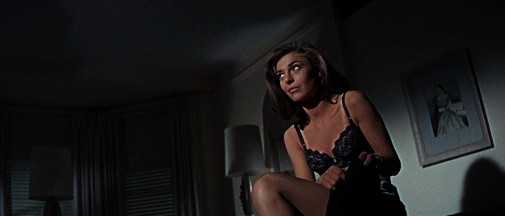
Some days ago, as part of our 1981 coverage, we talked about Katharine Hepburn's famous Oscar record. She's the only actor to ever have won four statuettes, all of them in the Best Actress category. In that piece, the idea was put forward that, despite her amazing career, the actress wasn't deserving of most of those victories. She might have merited four Academy Awards, but not for those particular works. We didn't explore who should have won in the years Hepburn triumphed, mainly because there isn't a lot of consensus about the matter. Still, while that's true regarding the 1933, 1968 (a tie!) and 1981 Oscars, the same can't be said about the 1967 awards. In that Best Actress race, one performance has shined brighter than all others, gaining a legendary status that goes way beyond the Oscars.
Since her movie is newly available to stream on Hulu, it seems like a good time to talk about Anne Bancroft as Mrs. Robinson in The Graduate…
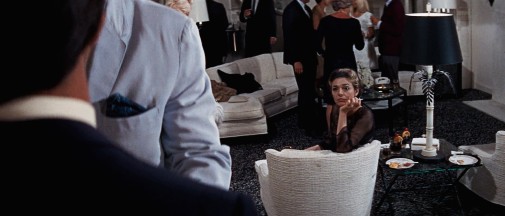
Mike Nichols' follow up to Who's Afraid of Virginia Woolf? is a zeitgeisty phenomenon whose cultural importance is difficult to overstate. Even those who have qualms about the picture's quality can't argue against The Graduate's place in movie history. Born out of a transitional period in Hollywood, the 1967 flick is a quarter-life crisis synthesized in celluloid, a portrait of Californian alienation that still resonates with the audiences of today. Its music is era-defining, its story unforgettable, its images galvanize the imagination and the characters seem both painfully real and like eternal archetypes bound to live forever as cinematic myths.
That's never truer than when we're talking about Mrs. Robinson, the middle-aged suburban housewife that seduces the college-aged son of family friends. Often clad in animal prints, perpetually made up with winged eyeliner and rarely found without a drink or a cigarette in her hands, she is the prototypical cougar who preys on the affections and virility of younger men. She's a vampire trying to suck the liveliness of another, the symbol of an older generation attempting to forcefully absorb the newer one. At least, that's the stereotype she's come to represent in the decades since the film premiered. Maybe that's who she is as she appears in the script adapted from a novel by Charles Webb.
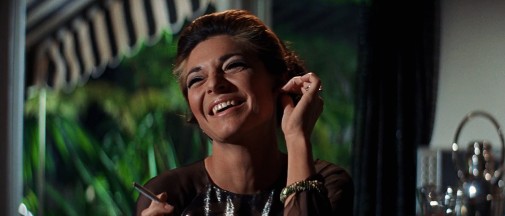
However, the smart lensing of director Mike Nichols and, more importantly, Anne Bancroft's canny performance elevate the character above that, mining her for inner depths and contradictions that aren't materialized on the page. Mrs. Robinson isn't a clichéd type or part of a young man's masturbatory existential crisis. She's a complicated woman whose bruised soul calls to us. That's quite visible from her first big sequence, one aggressive seduction act that's never as straightforward as it may appear. We initially see Bancroft's seductress in the background of a shaky shot following Dustin Hoffman's Ben Braddock through a party at his parents' house. He's sweaty and insecure, anxious beyond belief, his body as unstable as the camera. She, on the other hand, is still and demands our attention, anchoring the shot, and the movie in one fell swoop of minimal acting.
As she follows him into his bedroom under the pretense of looking for a bathroom, Mrs. Robinson's presence is preternaturally self-assured, so much so that she seems bored while cajoling Ben into giving her a ride home. At her place, that sense of insouciant tedium only becomes more apparent, her expression rarely changing from its monotonous state, even as her words become more suggestive and frank. A confession of alcoholism is uttered with calculated disinterest, a provocation from a master who wants to destabilize her companion. One feels that, whether the plan works or not, Mrs. Robinson will be indifferent about it.
Only when Ben starts to react panicky about the whole situation do we see something genuinely break through the stupor of middle-class intransigence – she's amused by him and she laughs. It's startling and it's sexy, her seduction working better than we have supposed. That same night, her attitude towards him goes from amused to impatient, from dry wit to the scolding countenance of a strict teacher dealing with a misbehaving student. Whether he knows it or not, Ben has taken the bait and so have we. From now on, even when she isn't onscreen, The Graduate is dominated by Mrs. Robinson and her dangerous allure.
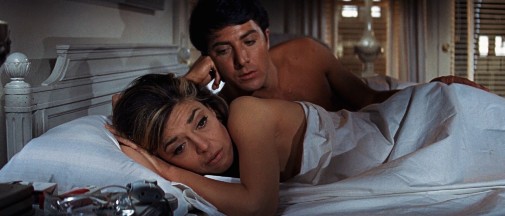
Later, after they've started an affair, Ben surprises her with a demand for further personal intimacy. Then, that mindless allure cracks and she lets us see more of what goes inside this woman's head. During a famous scene where a hotel room's lights keep being turned on and off, Bancroft turns her back to Hoffman, facing the camera as she allows the audience to see into a side of Mrs. Robinson she might not let anyone in her life observe. Consider how she speaks of studying art in college, how, for a moment, we get to see her not as a sultry mistress but as a mirror image of Ben's crisis. This all-consuming dissatisfaction stooped in regret is what may await him in the future. It's chilling.
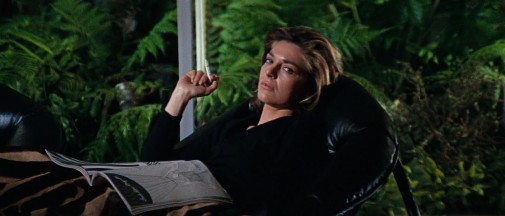
Even more upsetting is the way Bancroft plays her incandescent fury once Ben takes her daughter out on a date, breaking a promise he had made to his lover. If looks could kill, Dustin Hoffman would have left this Earth in 1967, that's for sure. Even then, that doesn't prepare anyone for the shattered despair the actress portrays when her sexual liaison is revealed to her progeny. Suddenly, it's as if something has emptied Mrs. Robinson's body of her soul, her spirit exorcised and leaving behind a catatonic shell that backs away into the corner of a white corridor. She is a black hole of utter despondence in the shape of a woman, an image that frightens and haunts.
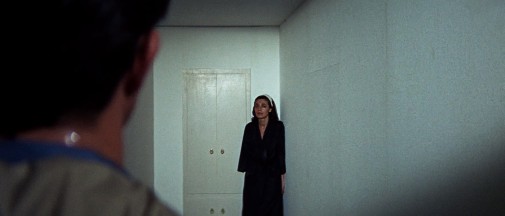
After that, Bancroft isn't in very much of The Graduate and the formal construction of her final moments doesn't allow the actress to give her character a full-rounded and satisfying arc. Still, it's difficult to imagine any other performer, including other candidates for the role like Ava Gardner, doing a better job. Bancroft's performance may be short, but it's virtually perfect, instantly iconic, and deserving of its fame. So sparse is her screen time that some say she should have competed as a supporting actress, where she'd be assured a win. Considering she lost to Katharine Hepburn in Guess Who's Coming to Dinner, those people may have a point. If it were up to you, would Bancroft have been victorious in 1967, and in what category?



Reader Comments (39)
This is beautifully written.
I am uncertain the character of Mrs. Robinson lacks a full rounded and satisfying arc. Throughout the film, Mrs. Robinson is angry. Bancroft imbues every line reading with the controlled anger of a woman disappointed by life. As the mutual interest between Benjamin and Elaine grows, Benjamin reveals that he has slept with her mother. Mrs. Robinson tells her husband and daughter that Benjamin raped her.
Elaine then leaves LA for college at UC Berkeley. There she has a boyfriend. He smokes a pipe. Twenty year olds don’t smoke pipes. The image tells us everything we need to know about Carl.
To discourage the relationship with Benjamin, the Robinsons pull their daughter from the University and arrange a quick marriage to Carl in Santa Barbara. Elaine is apparently incapable of thinking for herself. This path is not different than that of her mother who gave up her dreams of a career in art when she became pregnant.
Benjamin enters the church to stop Elaine’s wedding. On a second floor hallway above the narthex Benjamin beats on plate glass window and calls to Elaine. He is too late. They are married. Elaine’s parents and new husband cluster around her and shout angrily.
I find this to be one of the most interesting shots in the film. For the entire movie we have been waiting for Mrs. Robinson to have a moment to release a lifetime of rage. When she finally does, Nichols mutes the soundtrack. We watch her venom but cannot hear it. It is a strong statement of how women are silenced in a patriarchy.
Elaine calls for Ben who comes to snatch her away. Mrs. Robinson catches her daughter as Ben uses a cross from the church wall to fend off the middle aged wedding guests. Nichols does not mute this. Mrs. Robinson viciously slaps Elaine with power that sends her teeth rattling. Our eyes widen at the violence, but Elaine doesn’t retreat. It is evident she has been slapped like this before. Mrs. Robinson snarls, “It’s too late.” And Elaine replies, “Not for me.”
I think that’s the insight into Mrs. Robinson. She is a bitter alcoholic. Like most drunks, she cannot change her life till she faces her addiction. When she snarks at Elaine that it’s too late, she isn’t really discussing her daughter. She is presenting her assessment of her life, her dreams, her self worth.
Of course, she’s wrong.
Listen to the lyrics of the song, Mrs. Robinson, which discuss a spell at a rehab facility.
“And here's to you, Mrs. Robinson
Jesus loves you more than you will know, woo, woo, woo
God bless you please, Mrs. Robinson
Heaven holds a place for those who pray, hey hey hey
Hey hey hey
We'd like to know a little bit about you for our files
We'd like to help you learn to help yourself
Look around you, all you see are sympathetic eyes
Stroll around the grounds until you feel at home . . . “
James -- Thanks for the great comment. Rewatching the film before writing this, I did notice how angry she feels all the time. There's a fury burning inside her from minute one.
I'm not sure if I agree with you regarding Mrs. Robinson's muting in the wedding scene. The shot of her shouting in anger is part of a collection of other people doing the same, More than a comment on the patriarchy weighting down on Mrs. Robinson, it felt like a formalistic representation of Elaine's emotional state at that point. I might be wrong, but that was my interpretation of the moment.
I do wish the entire wedding scene paid a bit more attention to Mrs. Robinson though. I'm particularly bothered by the fact we never get to see her reaction to Elaine's "Not for me". In a way, that exchange, no matter how obvious or portentously symbolic it is, is as much a thesis of the film as the famous final moments in the bus. One wonders if the editing could have lingered just a bit more on it instead of quickly anonymizing Mrs. Robinson as just an out of focus part of the raving crowd chasing Ben and Elaine.
In any case, I appreciate the thought-provoking feedback immensely. Thank you, once more.
I believe Elaine's "Not for me" establishes her frame of mind for the culminating scene on the bus.
Benjamin and Elaine flee the church and hop a public bus filled with middle aged passengers. They take the bench at the back of the bus and laugh heartily. Most romantic comedies would end here. The Graduate does not.
Nichols chose to let the camera roll. As their exhilaration dissipates, Benjamin returns to his malaise that defines him.
Here the movie belongs to Katharine Ross. Elaine turns to Benjamin and sees that he fails to meet her gaze. Her eyes change. She looks briefly out the window and then faces forward with an indecipherable expression.
When asked, Ross who had already married and divorced twice when The Graduate was shot, remarked that during the long take she realized Elaine was getting off at the next stop. She was leaving Benjamin and her parents to be independent.
Now when I watch that scene I can’t think of any other context. This was four year after Betty Friedan published The Feminine Mystique and began a new movement for feminism. Elaine embodies the potential for women in a new societal construct.
James -- In regards to Elaine, I agree completely though I also think her "not for me" can stand for an entire generation's rejection of their parent's society. At least, multiple readings seem possible and even encouraged by the picture.
That iconic bus shot is perfect for how it lingers and Ross' performance is impeccable throughout, suggesting all you mention with utmost clarity but enough mystery to let people read ambivalence into the scene. It's both crystal-clear and, as you say, indecipherable. He's in his stupor again, but she feels determined and restless. I completely believe she got off on the next stop, turning her back on both Benjamin and her parents' domineering ways.
I should say that, from the Oscar lineups, I'd vote for both Graduate women in their categories.
Still one of the great movies of all time, but I would have voted for Dunaway that year I think, and Hoffman.
I go back and forth over whether Bancroft or Faye Dunaway is my favorite of the category, but I'd definitely give either the Oscar over Katharine Hepburn that year. I remember coming back to The Graduate when it was released on Criterion, it had been years since I last saw it and I was stunned at how little screen time Mrs. Robinson had in comparison to what I remembered. She's such an effective, towering figure and I think Best Actress is where Bancroft belongs. The performance/character is similar to Streep in The Devil Wears Prada in that way.
A great performance indeed, but I think Bancroft is a supporting actress and should have won easily that award, Dame Edith Evans is my winner of that year as a Leading actress.
Was going to say the same thing, Cafg. She is supporting in this and should have been placed there; Edith Evans deserved it.
Very nice analysis. Bancroft vs. Dunaway is a tough one, but I’m inclined to go Bancroft too.
Who wrote this piece? Always superb Katharine Hepburn richly deserved it for her heart-rending, sometimes funny, but touching performance in the magnificent, still timely "Guess Who's Coming to Dinner".
Jerold- I wrote this piece. Hello.
"If it were up to you, would Bancroft have been victorious in 1967, and in what category?"
all of them
Agree that Bancroft is Supporting in this... I can understand people choosing Leading but should add that the only way this makes sense is to also place Ross in Leading... which doesn’t make sense, hence both being Supporting.
Love her and the movie.
Great piece! So smartly, eloquently written and nails a lot of what makes Bancroft's performance so transcendental.
It's a hell of a lineup. Her, Dunaway and Evans are among the best nominees of the decade. All three would've made all-timer wins had she gotten the gold. Certainly another major reason why this specific Hepburn's win (with Long Day's and Lion just around the corner in the same decade) feels so underwhelming.
Once again, beautifully written Claudio.
I miss Anne Bancroft and contrary to many I love her in Agnes of God.
Mrs Robinson's is definitely one of the most memorable characters of all time
that year Bancroft , dunaway and evens were all oscar worthy and I think Audrey was also great!
To me this is one of the worst decisions oscar has ever made!
I think it's a borderline case. She is leading like the usual supervillain lead with little screentime - Anthony Hopkins in The Silence of The Lambs, Meryl Streep in The Devil Wears Prada, Forest Whitaker in The Last King of Scotland. When such a larger than life role like this dominates a movie in spite of little screentime, I always think of it as a leading role. You know, Julie Christie is not in that much of Dr. Zhivago, but it is a leading role. Screentime isn't everything.
Anne Bancroft should have won Best Actress for The Graduate.
Katharine Hepburn's deserved win was for the Lion in Winter the following year. However, she should not have tied. Barbra Streisand wasn't a patch on her.
Bancroft is stellar, but I would have given this to Dunaway in a walk in that particular lineup.
Still, Hepburn deserved the Oscar...and by Hepburn, I mean Audrey, for Two for the Road. It's a tragedy she wasn't even nominated. A career highlight and my favorite performance of 67.
I would have been tempted to vote for Edith Evans, but Anne Bancroft was a brilliant actress in "The Miracle Worker" and "The Graduate". I would have voted for her.
She might have a shorter screen time but I think that, much like Anthony Hopkins in The Silence of the Lambs, Bancroft's performance is so impactful that justifies her running as lead... and I would've given it to hear (with the caveat that I haven't seen Evans tho!). Really one for the ages.
Edith Evans.
I think Bancroft is correctly placed in lead, for the reasons cal roth said. And I think Ross is correctly placed in support; I don't feel the film is quite about Benjamin's relationship with Elaine the way it is about his relationship with Mrs. Robinson. Best Actress was a tough category that year; I haven't seen Evans, but of the others, I'd rank them thus:
Dunaway (only just ahead of)
Bancroft (only just ahead of)
Audrey Hepburn
Katharine Hepburn
As usual a great insightful piece!
She's absolutely brilliant in this! And even if the ghost of her character hangs over the film heavily she's still a supporting character to Benjamin's story and should have competed there where a win would have probably been a cinch.
While I could see other actresses doing well in the role especially the aforementioned Ava Gardner (too bad she and Bancroft were never cast as sisters-that could have been dynamite) Anne brings so much to the table that I doubt that any of the others considered, fine actresses all, would have found the particular wells of pathos necessary to make Mrs. Robinson have as much impact she does.
this was a pretty great oscar shortlist. Bancroft is my favourite among the nominees but practically the whole lineup is fire.
I think Bancroft should have won in ‘67 and Hepburn in ‘62. Both years are among the best Best Actress lineups for me.
Drew, you said exactly what I was going to say! Audrey Hepburn in Two For The Road is my favorite performance of hers (barring early work like Roman Holiday) and I would have given her the Oscar for that in this year.
@markgordonuk - I saw Agnes of God a few weeks back and, while I can't say the same about her performance in that film, I do agree with the rest of your statement. I miss her too! One of my favorite later-years Bancroft performances is in Great Expectations.
Evans for me, definitely, but only by a bit over Bancroft and Dunaway.
Agreed-Bancroft took Hepburn’s deserved Best Actress for Long Day’s Journey, while Hepburn ended up with Bancroft’s deserved Best Actress for The Graduate.
Edith Evans, but just barely over Bancroft and Dunaway not too far behind them.
Anne Bancroft is spectacular in "The Graduate": she gives a sexy, mysterious, economical, fascinating performance. Whenever I watch the movie, she always leaves me wanting to see more of her; I'd kill to see her deleted scenes (if any), or even outtakes.
She's also phenomenal in a much more sympathetic role in "The Pumpkin Eater" (1964). The film's milieu differs from that of "The Graduate," but both movies cover much of the same ground: sexual dynamics and sour marriages. Watching her in "The Pumpkin Eater" is almost like watching a British Mrs. Robinson before she became cynical and hardened.
The role of Mrs. Robinson is small (less than half an hour), but it's a testament to the quality of Bancroft's performance that she seems like a lead. But given her screen time, I'd place her in the supporting category. Either way, in my book, she wins.
I was surprised by the little screentime she has. Bancroft just fills up the screen. Mrs. Robinson is so complex and alluring and somehow kind of repulsive in the same scene. This movie is not Benjamin's but hers. It is all hers.
Bancroft is billed above Hoffman!! She is the LEAD actress in The Graduate!
Back in those days, Stars do NOT measure their screen time so tt they cld category-fraud themselves into supporting category to win, unlike the rampant trend now.
& all the best for it!! Thank U v Much!
Even if the only leading in The Graduate is Benji I accept Bancroft in Best Actress category and I confess that my vote would have been for Bancroft, Hoffman and Ross.
My Personal Best Actress Oscar:
1962: Geraldine Page (Davis as runner-up)
1967: Anne Bancroft (Dunaway as runner-up)
1985: Whoopi Goldberg
She is in the correct category and she should have won. The performance is one of the greatest in cinema--which creates a seismic impact in the story of the film--and the character of Mrs. Robinson casts a long shadow throughout the movie. Bancroft dominates in a way few characters do; for that alone she should be the winner and for the lead category. The scene where she "discusses" art--this alone should have won her the Academy Award.
Great writeup, Claudio!
She's a bit like Hannibal Lector, isn't she?
I always watch this movie expecting Mrs. Robinson to be a bored, horny, unfulfilled housewife. I'm always amazed to discover that her coldness, cruelty and selfishness is...pathological. She's the story's archetypical witch-villain in every way.
It's not just a sexy performance but a chilling, terrifying one.
I love Anne Bancroft, but I really do think Ava Gardner would have been perfection in this role.